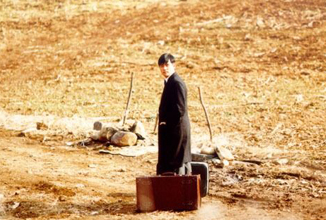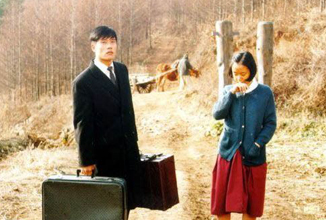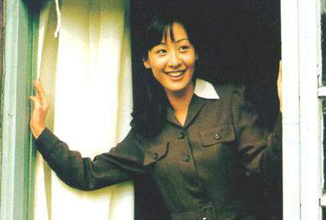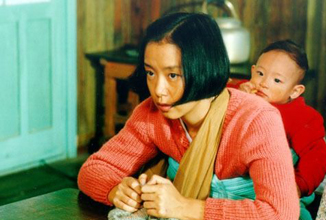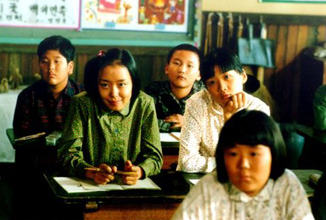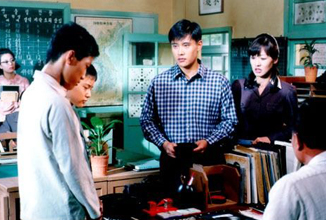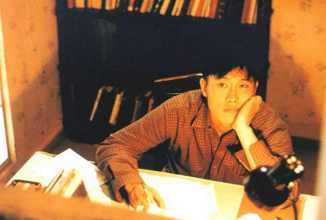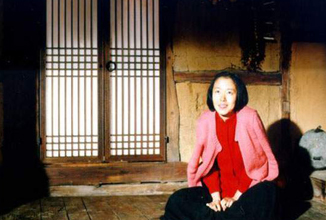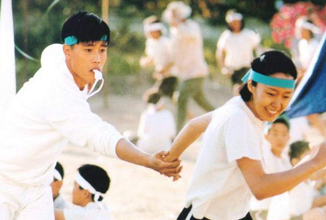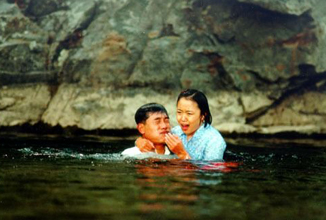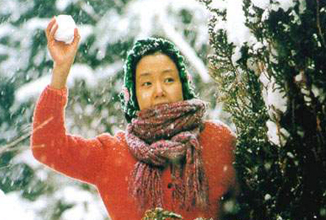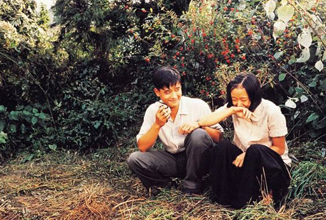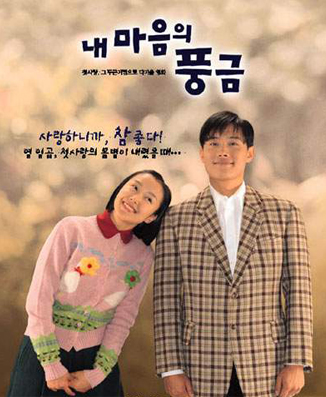
 |
|||||||||||||
Synopsis: Set in 1963, The Harmonium In My Memory begins to the strains of “Don't Break My Heart" by Connie Francis, as twenty-one year old teacher Kang Su-ha (Lee Byung-hun) travels to take up a position at Sanri Elementary School.
As he begins to settle in to his new life, he finds himself increasingly attracted to twenty-five year-old, fellow teacher, Yang Eun-hee (Lee Mi-yeon) but, unbeknownst to him, his presence at the school is having a major impact on one of his students, seventeen year-old Hong-yeon (Jeon Do-yeon), who is quickly developing a huge crush on him and becoming increasingly frustrated at not being able to vocalise both her feelings for him and her jealousy of Eun-hee. However, when Su-ha sets his students the task of keeping a journal, Hong-yeon uses the assignment as an opportunity to write down the intricacies of her loves (and hates), knowing full-well that he will read every word, and placing Su-ha at the very centre of a love triangle between the three...
Review: Hong-yeon is walking a tightrope between childhood and womanhood. At seventeen, she is older than most than most of her school friends but the familiarity of her associations with them consistently pulls her back into the persona of a child at play. The little experience of adult life she has had, so far, has involved only chores and family responsibilities - all of which she hates - and, as such, her growing crush on Su-ha unleashes feelings which she has never before felt. Her inexperience and confusion of how best to cope with this new situation (combined with her, almost blundering, attempts to make him see her as a woman), result in a kind of emotional schizophrenia within her - when surrounded by her family or friends she's her usual wild, tomboyish self, but when placed face to face with the object of her affection, she can barely speak, or even look him in the eye and is, instead, subconsciously forced to stare at the ground shyly and run away, back to the comfort zone of childhood, at the first available opportunity.
Her later journal entries finally provide her with an outlet for the feelings she has been unable to outwardly express, and though she never comes right out with a declaration of love, her comments - regarding the attentive (and often hilarious) observations she makes - place her heart firmly on her sleeve. Regardless of whether or not she is ultimately able to attain the love which she so deeply desires, those observations nonetheless become her saving grace.
Similarly, Su-ha has little life experience and, in meeting Eun-hee, he too falls in love with an older member of the opposite sex. However, where he and Hong-yeon differ is in their focus (within their respective affections) - while Hong-yeon is desperate to find ways to make Su-ha like her, Su-ha is searching for a love who will be able to share his passion for music and vinyl LPs, with which he fills the vast majority of his spare time. When he discovers that Eun-hee also likes the same songs, he instantly believes that he has found his perfect match, and Hong-yeon is pushed yet further out of his field of vision. The destruction of one of his prized Connie Francis records heralds both a physical and metaphorical falling apart of most of the things that he holds dear, causing him to begin to question everything he was previously sure of and, only when his passions are once more empathised with, is he able to find his heart again.
Films bases on stories of first love (or indeed love triangles) are two-a-penny in most countries and cultures, but where The Harmonium In My Memory stands head and shoulders above the rest is in the detailed and nuanced depictions of the day-to-day lives of the characters. Given a gentle humour, and combined with a set of warmly kooky supporting characters, these tiny moments ensure that the story (which, for a large portion of the film, is a sad tale) never feels downbeat and, instead, keeps a light-hearted and touching playfulness throughout. Cinematically, The Harmonium In My Memory is like a beautiful, lazy summer day in the sun, and the gorgeous musical soundtrack, peppered throughout with classic songs by the likes of Connie Francis and The Platters, serves to create an underlying feeling of an all-the-time-in-the-world summer drive. Even when the plot moves towards elements of melodrama (Hong-yeon needing to be rescued from a river, and a fire occurring at the school), this never diminishes and, in fact, remains until the very last moments of the plot. Speaking of which, those final moments conclude the, frankly lovely, story in a totally unexpected and uplifting fashion - raising overall viewer opinion of the film from "warmly beautiful" to "gentle, yet unforgettable".
With regard to the themes present, repeated references to the poverty prevalent in rural areas of South Korea at the time, and the resultant fall out in terms of education in those areas, subtly underline the tale within The Harmonium In My Memory. Many of the parents of the children at Sanri Elementary School are barely literate, having had to drop out of school at a young age to work (with note made that many in the area left school after the sixth grade), and even Hong-yeon is shown bringing her baby brother to school (and changing his nappy in the middle of class) because her parents cannot afford a babysitter and have no alternative but to go out to work so that the family can survive.
Cast:
Summary: DVD:
DVD Details: Actors: Jeon Do-yeon, Lee Byung-hun, Lee Mi-yeon DVD Extras: Director's Commentary
|
|||||||||||||
All images © Tai Seng Entertainment, Prism Leisure Review © P. Quinn |
|||||||||||||
